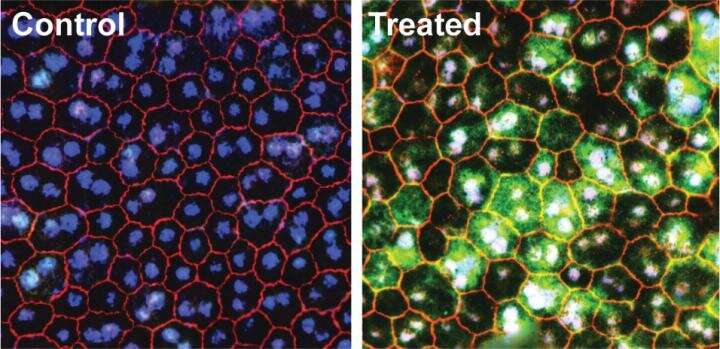#Study reveals restoration of retinal and visual function following gene therapy

“#Study reveals restoration of retinal and visual function following gene therapy”

A breakthrough study, led by researchers from the University of California, Irvine, results in the restoration of retinal and visual functions of mice models suffering from inherited retinal disease.
Published today in Nature Biomedical Engineering, the paper, titled, “Restoration of visual function in adult mice with an inherited retinal disease via adenine base editing,” illustrates the use of a new generation CRISPR technology and lays the foundation for the development of a new therapeutic modality for a wide range of inherited ocular diseases caused by different gene mutations.
“In this proof-of-concept study, we provide evidence of the clinical potential of base editors for the correction of mutations causing inherited retinal diseases and for restoring visual function,” said Krzysztof Palczewski, Ph.D., the Irving H. Leopold chair and a distinguished professor in the Gavin Herbert Eye Institute, Department of Ophthalmology at the UCI School of Medicine. “Our results demonstrate the most successful rescue of blindness to date using genome editing.”
Inherited retinal diseases (IRDs) are a group of blinding conditions caused by mutations in more than 250 different genes. Previously, there was no avenue available for treating these devastating blinding diseases. Recently, the FDA approved the first gene augmentation therapy for Leber congenital amaurosis (LCA), a common form of IRD which originates during childhood.
“As an alternative to gene augmentation therapy, we applied a new generation of CRISPR technology, referred to as ‘base editing’ as a treatment for inherited retinal diseases,” said first author Susie Suh, assistant specialist in the UCI School of Medicine Department of Ophthalmology.
“We overcame some of the barriers to the CRISPR-Cas9 system, such as unpredictable off-target mutations and low editing efficiency, by utilizing cytosine and adenine base editors (CBE and ABE). Use of these editors enabled us to correct point mutations in a precise and predictable manner while minimizing unintended mutations that could potentially cause undesirable side effects,” said co-first author Elliot Choi, also an assistant specialist in the UCI Department of Ophthalmology.
Using an LCA mouse model harboring a clinically relevant pathogenic mutation in the Rpe65 gene, the UCI team successfully demonstrated the therapeutic potential of base editing for the treatment of LCA and by extension other inherited blinding diseases. Among other results, the base editing treatment restored retinal and visual function in LCA mice to near-normal levels.
“After receiving treatment, the mice in our study could discriminate visual changes in terms of direction, size, contrast and spatial and temporal frequency,” said Palczewski. “These results are extremely encouraging and represent a major advance towards the development of treatments for inherited retinal diseases.”
Gene therapy approaches to treating inherited retinal diseases are of special interest given the accessibility of the eye, its immune-privileged status and the successful clinical trials of RPE65 gene augmentation therapy that led to the first US Food and Drug Administration-approved gene therapy. Now, as demonstrated in this study, base-editing technology can provide an alternative treatment model of gene augmentation therapy to permanently rescue the function of a key vision-related protein disabled by mutations.
New gene therapy method improves vision in mice with congenital blindness
Susie Suh et al, Restoration of visual function in adult mice with an inherited retinal disease via adenine base editing, Nature Biomedical Engineering (2020). DOI: 10.1038/s41551-020-00632-6
Citation:
Study reveals restoration of retinal and visual function following gene therapy (2020, October 19)
retrieved 20 October 2020
from https://medicalxpress.com/news/2020-10-reveals-retinal-visual-function-gene.html
This document is subject to copyright. Apart from any fair dealing for the purpose of private study or research, no
part may be reproduced without the written permission. The content is provided for information purposes only.
For forums sites go to Forum.BuradaBiliyorum.Com
If you want to read more Like this articles, you can visit our Science category.



